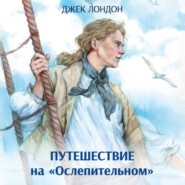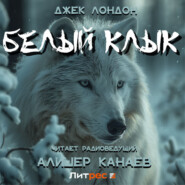По всем вопросам обращайтесь на: info@litportal.ru
(©) 2003-2024.
✖
Smoke Bellew
Настройки чтения
Размер шрифта
Высота строк
Поля
He dropped behind very slowly, though when the last relay station was in sight he was fully half a mile in the rear. Ahead, bunched together, Smoke could see Big Olaf and Von Schroeder. Again Smoke arose to his knees, and he lifted his jaded dogs into a burst of speed such as a man only can who has the proper instinct for dog-driving. He drew up close to the tail of Von Schroeder’s sled, and in this order the three sleds dashed out on the smooth going below a jam, where many men and many dogs waited. Dawson was fifteen miles away.
Von Schroeder, with his ten-mile relays, had changed five miles back and would change five miles ahead. So he held on, keeping his dogs at full leap. Big Olaf and Smoke made flying changes, and their fresh teams immediately regained what had been lost to the Baron. Big Olaf led past, and Smoke followed into the narrow trail beyond.
“Still good, but not so good,” Smoke paraphrased Spencer to himself.
Of Von Schroeder, now behind, he had no fear; but ahead was the greatest dog-driver in the country. To pass him seemed impossible. Again and again, many times, Smoke forced his leader to the other’s sled-tail, and each time Big Olaf let out another link and drew away. Smoke contented himself with taking the pace, and hung on grimly. The race was not lost until one or the other won, and in fifteen miles many things could happen.
Three miles from Dawson something did happen. To Smoke’s surprise, Big Olaf rose up and with oaths and leather proceeded to fetch out the last ounce of effort in his animals. It was a spurt that should have been reserved for the last hundred yards instead of being begun three miles from the finish. Sheer dog-killing that it was, Smoke followed. His own team was superb. No dogs on the Yukon had had harder work or were in better condition. Besides, Smoke had toiled with them, and eaten and bedded with them, and he knew each dog as an individual and how best to win in to the animal’s intelligence and extract its last least shred of willingness.
They topped a small jam and struck the smooth going below. Big Olaf was barely fifty feet ahead. A sled shot out from the side and drew in toward him, and Smoke understood Big Olaf’s terrific spurt. He had tried to gain a lead for the change. This fresh team that waited to jerk him down the home stretch had been a private surprise of his. Even the men who had backed him to win had had no knowledge of it.
Smoke strove desperately to pass during the exchange of sleds. Lifting his dogs to the effort, he ate up the intervening fifty feet. With urging and pouring of leather, he went to the side and on until his lead-dog was jumping abreast of Big Olaf’s wheeler. On the other side, abreast, was the relay sled. At the speed they were going, Big Olaf did not dare try the flying leap. If he missed and fell off, Smoke would be in the lead and the race would be lost.
Big Olaf tried to spurt ahead, and he lifted his dogs magnificently, but Smoke’s leader still continued to jump beside Big Olaf’s wheeler. For half a mile the three sleds tore and bounced along side by side. The smooth stretch was nearing its end when Big Olaf took the chance. As the flying sleds swerved toward each other, he leaped, and the instant he struck he was on his knees, with whip and voice spurting the fresh team. The smooth stretch pinched out into the narrow trail, and he jumped his dogs ahead and into it with a lead of barely a yard.
A man was not beaten until he was beaten, was Smoke’s conclusion, and drive no matter how, Big Olaf failed to shake him off. No team Smoke had driven that night could have stood such a killing pace and kept up with fresh dogs – no team save this one. Nevertheless, the pace WAS killing it, and as they began to round the bluff at Klondike City, he could feel the pitch of strength going out of his animals. Almost imperceptibly they lagged behind, and foot by foot Big Olaf drew away until he led by a score of yards.
A great cheer went up from the population of Klondike City assembled on the ice. Here the Klondike entered the Yukon, and half a mile away, across the Klondike, on the north bank, stood Dawson. An outburst of madder cheering arose, and Smoke caught a glimpse of a sled shooting out to him. He recognized the splendid animals that drew it. They were Joy Gastell’s. And Joy Gastell drove them. The hood of her squirrel-skin parka was tossed back, revealing the cameo-like oval of her face outlined against her heavily-massed hair. Mittens had been discarded, and with bare hands she clung to whip and sled.
“Jump!” she cried, as her leader snarled at Smoke’s.
Smoke struck the sled behind her. It rocked violently from the impact of his body, but she was full up on her knees and swinging the whip.
“Hi! You! Mush on! Chook! Chook!” she was crying, and the dogs whined and yelped in eagerness of desire and effort to overtake Big Olaf.
And then, as the lead-dog caught the tail of Big Olaf’s sled, and yard by yard drew up abreast, the great crowd on the Dawson bank went mad. It WAS a great crowd, for the men had dropped their tools on all the creeks and come down to see the outcome of the race, and a dead heat at the end of a hundred and ten miles justified any madness.
“When you’re in the lead I’m going to drop off!” Joy cried out over her shoulder.
Smoke tried to protest.
“And watch out for the dip curve half way up the bank,” she warned.
Dog by dog, separated by half a dozen feet, the two teams were running abreast. Big Olaf, with whip and voice, held his own for a minute. Then, slowly, an inch at a time, Joy’s leader began to forge past.
“Get ready!” she cried to Smoke. “I’m going to leave you in a minute. Get the whip.”
And as he shifted his hand to clutch the whip, they heard Big Olaf roar a warning, but too late. His lead-dog, incensed at being passed, swerved in to the attack. His fangs struck Joy’s leader on the flank. The rival teams flew at one another’s throats. The sleds overran the fighting brutes and capsized. Smoke struggled to his feet and tried to lift Joy up. But she thrust him from her, crying: “Go!”
On foot, already fifty feet in advance, was Big Olaf, still intent on finishing the race. Smoke obeyed, and when the two men reached the foot of the Dawson bank, he was at the other’s heels. But up the bank Big Olaf lifted his body hugely, regaining a dozen feet.
Five blocks down the main street was the gold-recorder’s office. The street was packed as for the witnessing of a parade. Not so easily this time did Smoke gain to his giant rival, and when he did he was unable to pass. Side by side they ran along the narrow aisle between the solid walls of fur-clad, cheering men. Now one, now the other, with great convulsive jerks, gained an inch or so, only to lose it immediately after.
If the pace had been a killing one for their dogs, the one they now set themselves was no less so. But they were racing for a million dollars and greatest honour in Yukon Country. The only outside impression that came to Smoke on that last mad stretch was one of astonishment that there should be so many people in the Klondike. He had never seen them all at once before.
He felt himself involuntarily lag, and Big Olaf sprang a full stride in the lead. To Smoke it seemed that his heart would burst, while he had lost all consciousness of his legs. He knew they were flying under him, but he did not know how he continued to make them fly, nor how he put even greater pressure of will upon them and compelled them again to carry him to his giant competitor’s side.
The open door of the Recorder’s office appeared ahead of them. Both men made a final, futile spurt. Neither could draw away from the other, and side by side they hit the doorway, collided violently, and fell headlong on the office floor.
They sat up, but were too exhausted to rise. Big Olaf, the sweat pouring from him, breathing with tremendous, painful gasps, pawed the air and vainly tried to speak. Then he reached out his hand with unmistakable meaning; Smoke extended his, and they shook.
“It’s a dead heat,” Smoke could hear the Recorder saying, but it was as if in a dream, and the voice was very thin and very far away. “And all I can say is that you both win. You’ll have to divide the claim between you. You’re partners.”
Their two arms pumped up and down as they ratified the decision. Big Olaf nodded his head with great emphasis, and spluttered. At last he got it out.
“You damn chechako,” was what he said, but in the saying of it was admiration. “I don’t know how you done it, but you did.”
Outside, the great crowd was noisily massed, while the office was packing and jamming. Smoke and Big Olaf essayed to rise, and each helped the other to his feet. Smoke found his legs weak under him, and staggered drunkenly. Big Olaf tottered toward him.
“I’m sorry my dogs jumped yours.”
“It couldn’t be helped,” Smoke panted back. “I heard you yell.”
“Say,” Big Olaf went on with shining eyes. “That girl – one damn fine girl, eh?”
“One damn fine girl,” Smoke agreed.
VII. THE LITTLE MAN
“I wisht you wasn’t so set in your ways,” Shorty demurred. “I’m sure scairt of that glacier. No man ought to tackle it by his lonely.”
Smoke laughed cheerfully, and ran his eye up the glistening face of the tiny glacier that filled the head of the valley. “Here it is August already, and the days have been getting shorter for two months,” he epitomized the situation. “You know quartz, and I don’t. But I can bring up the grub, while you keep after that mother lode. So-long. I’ll be back by to-morrow evening.”
He turned and started.
“I got a hunch something’s goin’ to happen,” Shorty pleaded after him.
But Smoke’s reply was a bantering laugh. He held on down the little valley, occasionally wiping the sweat from his forehead, the while his feet crushed through ripe mountain raspberries and delicate ferns that grew beside patches of sun-sheltered ice.
In the early spring he and Shorty had come up the Stewart River and launched out into the amazing chaos of the region where Surprise Lake lay. And all of the spring and half of the summer had been consumed in futile wanderings, when, on the verge of turning back, they caught their first glimpse of the baffling, gold-bottomed sheet of water which had lured and fooled a generation of miners. Making their camp in the old cabin which Smoke had discovered on his previous visit, they had learned three things: first, heavy nugget gold was carpeted thickly on the lake bottom; next, the gold could be dived for in the shallower portions, but the temperature of the water was man-killing; and, finally, the draining of the lake was too stupendous a task for two men in the shorter half of a short summer. Undeterred, reasoning from the coarseness of the gold that it had not traveled far, they had set out in search of the mother lode. They had crossed the big glacier that frowned on the southern rim and devoted themselves to the puzzling maze of small valleys and canyons beyond, which, by most unmountainlike methods, drained, or had at one time drained, into the lake.
The valley Smoke was descending gradually widened after the fashion of any normal valley; but, at the lower end, it pinched narrowly between high precipitous walls and abruptly stopped in a cross wall. At the base of this, in a welter of broken rock, the streamlet disappeared, evidently finding its way out underground. Climbing the cross wall, from the top Smoke saw the lake beneath him. Unlike any mountain lake he had ever seen, it was not blue. Instead, its intense peacock-green tokened its shallowness. It was this shallowness that made its draining feasible. All about arose jumbled mountains, with ice-scarred peaks and crags, grotesquely shaped and grouped. All was topsyturvy and unsystematic – a Dore nightmare. So fantastic and impossible was it that it affected Smoke as more like a cosmic landscape-joke than a rational portion of earth’s surface. There were many glaciers in the canyons, most of them tiny, and, as he looked, one of the larger ones, on the north shore, calved amid thunders and splashings. Across the lake, seemingly not more than half a mile, but, as he well knew, five miles away, he could see the bunch of spruce-trees and the cabin. He looked again to make sure, and saw smoke clearly rising from the chimney. Somebody else had surprised themselves into finding Surprise Lake, was his conclusion, as he turned to climb the southern wall.
From the top of this he came down into a little valley, flower-floored and lazy with the hum of bees, that behaved quite as a reasonable valley should, in so far as it made legitimate entry on the lake. What was wrong with it was its length – scarcely a hundred yards; its head a straight up-and-down cliff of a thousand feet, over which a stream pitched itself in descending veils of mist.
And here he encountered more smoke, floating lazily upward in the warm sunshine beyond an outjut of rock. As he came around the corner he heard a light, metallic tap-tapping and a merry whistling that kept the beat. Then he saw the man, an upturned shoe between his knees, into the sole of which he was driving hob-spikes.
“Hello!” was the stranger’s greeting, and Smoke’s heart went out to the man in ready liking. “Just in time for a snack. There’s coffee in the pot, a couple of cold flapjacks, and some jerky.”
“I’ll go you if I lose,” was Smoke’s acceptance, as he sat down. “I’ve been rather skimped on the last several meals, but there’s oodles of grub over in the cabin.”
“Across the lake? That’s what I was heading for.”
“Seems Surprise Lake is becoming populous,” Smoke complained, emptying the coffee-pot.
“Go on, you’re joking, aren’t you?” the man said, astonishment painted on his face.
Smoke laughed. “That’s the way it takes everybody. You see those high ledges across there to the northwest? There’s where I first saw it. No warning. Just suddenly caught the view of the whole lake from there. I’d given up looking for it, too.

















